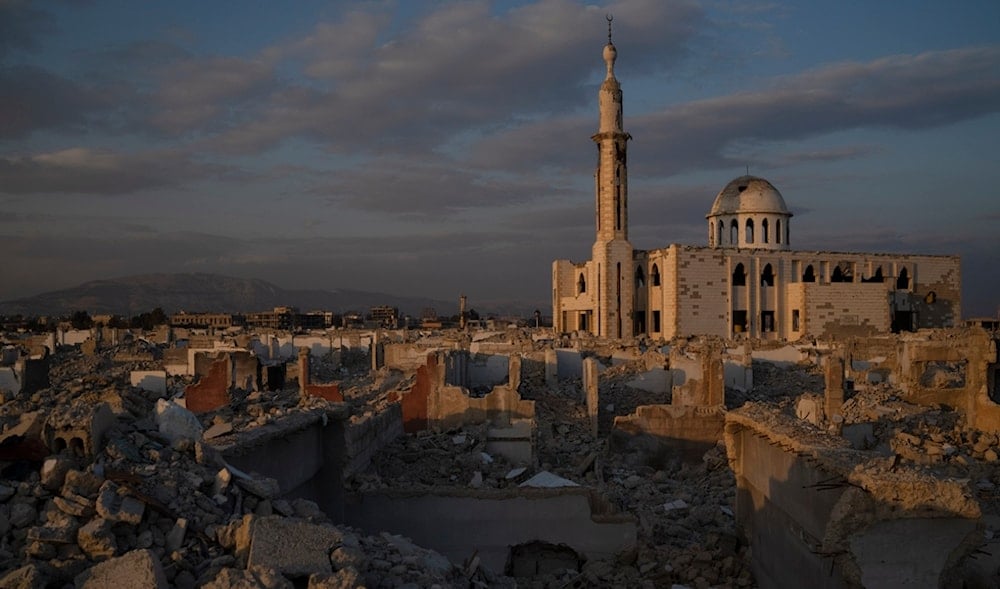Will Arab states get ahead of Turkiye in the race for Syria?: WSJ
Syria has been transformed into a platform for strategic competition, with Arab states racing to get ahead as Turkiye holds onto the headstart it gained after the fall of the Assad regime.
-

A heavily damaged mosque is seen surrounded by buildings that were completely destroyed during the war in the Al-Asali neighborhood in Damascus, Syria, on Monday, January 6, 2025. (AP)
Arab states, led by Saudi Arabia, are vying for influence in Syria following the fall of the Assad regime, despite concerns about the Islamist roots of its new leaders.
A report by The Wall Street Journal said that countries like Saudi Arabia, Jordan, and Qatar have been pumping humanitarian aid and energy assistance, aiming to secure strategic advantages such as curbing drug trafficking, reducing radical fighter flows, and countering the influence of rivals like Turkiye and Iran.
The Arab League, which suspended Syria in 2011, has recently pushed to renew ties in light of the political developments in the country. Saudi Arabia is particularly taking proactive steps, including establishing a humanitarian air bridge, offering police training, and offering to replace sanctioned Iranian oil to address Syria's energy crisis.
Analysts suggest these actions are driven by strategic interests rather than pure altruism, as the region navigates the power vacuum and shifting dynamics in the post-Assad era.
The current Syrian leadership is ruled by Hay'at Tahrir al-Sham (HTS), an offshoot of al-Qaeda, and was designated as a terrorist organization until most recently. Extremist groups in the Middle East have been of major concern, even fear, to the Gulf regimes.
The Syrian situation parallels that of post-Muslim Brotherhood Egypt. The Muslim Brotherhood has thorned Saudi Arabia and the UAE, but its collapse prompted the flow of Saudi and Emirati aid and investments in Egypt and its president, Abdel Fattah el-Sisi.
The geopolitical competition for Syria
Saudi's next move, however, would prove to be detrimental if it wants to avoid falling out of the race as it did in Iraq, post-Saddam Hussein. Currently, Turkiye has a headstart in Syria, and "has an expanded platform to project power in the region," according to the WSJ.
Saudi Arabia, according to Fawaz Gerges, a professor of international relations at the London School of Economics, aims to counterbalance the Turkish influence and role in New Syria,
Moreover, Qatar, which did not follow the steps of other Arab regimes when they normalized ties with Syria in 2023, bridged the gap following the regime shift and is currently engaged in advanced dialogue with Damascus. Doha also offered to provide financial and energy assistance to Syria.
The UAE, on the other hand, expressed concerns about HTS and the ruling leadership in Syria, citing their past affiliations and worries about potential relapses. According to Anwar Gargash, a diplomatic advisor to the Emirati government, the possibility of radical elements within Syria's armed factions rising to power would "lead us to another crisis in the region."
The Israeli occupation, however, approached the Syrian situation with a different maneuver, taking advantage of the recent political shift in Syria. Exploiting the instability, the occupation has intensified its aggression by targeting Syria's military infrastructure, destroying vital facilities, and occupying an estimated 600 square kilometers of southern Syrian territory.
Yesterday, the Times of Israel reported that Israeli government and security officials have been covertly scheming to establish an international summit that would propose the division of Syria into cantons, under the guise that it would preserve the rights and safety of all the diverse ethnic groups within the country.
According to Israel Hayom, the officials discussed the plot in December, right after the collapse of the Assad regime in Syria, with Israeli Energy Minister Eli Cohen proposing an international summit that would discuss its possibility.

 4 Min Read
4 Min Read








